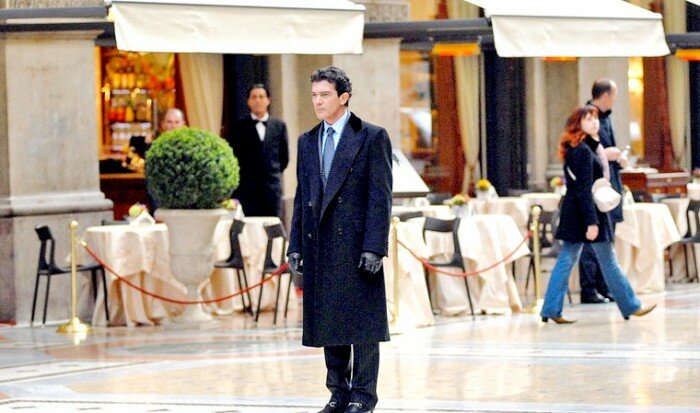Richard Eyre’s The Other Man is one of those infuriating films that starts out with an engaging premise but fails to deliver on any of its promises.
Liam Neeson (Taken, The A-Team) stars as Peter, a successful software developer. He is happily married to Lisa (Laura Linney) and they have one grown daughter. When Lisa seemingly disappears, Peter is devastated to discover that she has been having an affair for a number of years with a man named Ralph (Antonio Banderas) who lives in Milan.
Driven by rage and the need for vengeance Peter sets out for Milan in a quest to find his wife’s lover and to quite possibly kill him. Unfortunately for The Other Man this jumping off point is where the film ends for the audience because everything that follows is an illogical mess, which is a real shame considering this could have been a tense and effective psychological drama.
When Peter arrives in Milan he follows Ralph (who prefers to be called Rafe for some reason) to a local café and they play chess. Ralph openly talks about his great love Lisa unbeknown to him that Peter is her husband and that all the recent emails Ralph has received from Lisa are actually from Peter, pretending to be Lisa. Though Peter is obviously playing a dangerous and cruel game, he displays little self control and is often prone to emotional outbursts that Ralph doesn’t seem to notice.
At one point Peter’s daughter (Romola Garai) simply turns up in Milan with absolutely no explanation offered as to how or why she is there, she just happens to bump into her father on the street. She also can’t seem to understand why her father would be so obsessed with uncovering the truth about his wife’s secret life.
While the main problem with The Other Man lies within Richard Eyre and Charles Wood’s illogical and incompetently written script, the biggest crime committed here is the twist that comes near the end of the film. It’s one thing to cleverly trick the audience and defy expectations, but when a “twist” is nothing more than a blatant lie, it only makes the audience feel duped. To worsen the blow, the twist here is completely reliant on carefully worded dialogue that just doesn’t add up.
The cast does what they can with the limiting material but there is no saving grace. Neeson is as intense as usual but often has to rely on simply being really angry without having a lot to say, which disconnects the audience from his plight. Banderas and Linney also perform well in their roles but this is one of those films where no amount of great acting can cover up the fact that it’s a true stinker. One has to wonder how such an accomplished cast was drawn to such a poor excuse for a screenplay. Luckily none of the players will have to feel too much embarrassment about being involved as due to being in limited release (and straight to DVD in most territories) virtually no one ended up seeing the film.
Verdict:
The Other Man is a manipulative bore of a film. Liam Neeson is better than this and so are you.







![The A-Team [2010] (Review) The A-Team [2010] (Review)](/wp-content/uploads/jessica-biel-as-lt-sosa-the-a-team-movie-image-400x6001-150x150.jpg)
![Clash of the Titans [2010] (Review) Clash of the Titans [2010] (Review)](/wp-content/uploads/clash_of_the_titans011-150x150.jpg)








